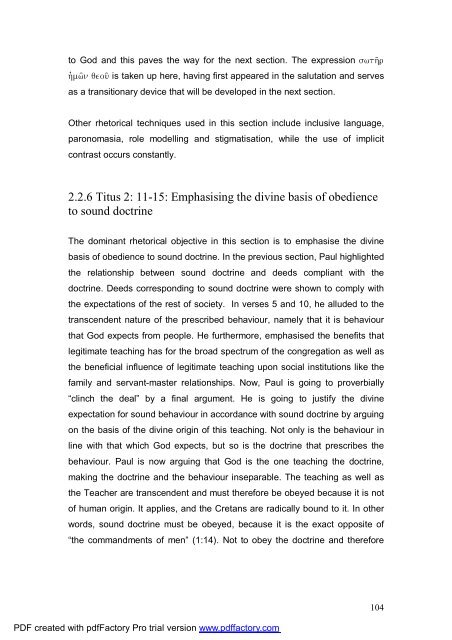A Text centred rhetorical analysis of Paul's Letter to Titus
A Text centred rhetorical analysis of Paul's Letter to Titus
A Text centred rhetorical analysis of Paul's Letter to Titus
You also want an ePaper? Increase the reach of your titles
YUMPU automatically turns print PDFs into web optimized ePapers that Google loves.
<strong>to</strong> God and this paves the way for the next section. The expression swth`r<br />
hJmw`n qeou' is taken up here, having first appeared in the salutation and serves<br />
as a transitionary device that will be developed in the next section.<br />
Other <strong>rhe<strong>to</strong>rical</strong> techniques used in this section include inclusive language,<br />
paronomasia, role modelling and stigmatisation, while the use <strong>of</strong> implicit<br />
contrast occurs constantly.<br />
2.2.6 <strong>Titus</strong> 2: 11-15: Emphasising the divine basis <strong>of</strong> obedience<br />
<strong>to</strong> sound doctrine<br />
The dominant <strong>rhe<strong>to</strong>rical</strong> objective in this section is <strong>to</strong> emphasise the divine<br />
basis <strong>of</strong> obedience <strong>to</strong> sound doctrine. In the previous section, Paul highlighted<br />
the relationship between sound doctrine and deeds compliant with the<br />
doctrine. Deeds corresponding <strong>to</strong> sound doctrine were shown <strong>to</strong> comply with<br />
the expectations <strong>of</strong> the rest <strong>of</strong> society. In verses 5 and 10, he alluded <strong>to</strong> the<br />
transcendent nature <strong>of</strong> the prescribed behaviour, namely that it is behaviour<br />
that God expects from people. He furthermore, emphasised the benefits that<br />
legitimate teaching has for the broad spectrum <strong>of</strong> the congregation as well as<br />
the beneficial influence <strong>of</strong> legitimate teaching upon social institutions like the<br />
family and servant-master relationships. Now, Paul is going <strong>to</strong> proverbially<br />
“clinch the deal” by a final argument. He is going <strong>to</strong> justify the divine<br />
expectation for sound behaviour in accordance with sound doctrine by arguing<br />
on the basis <strong>of</strong> the divine origin <strong>of</strong> this teaching. Not only is the behaviour in<br />
line with that which God expects, but so is the doctrine that prescribes the<br />
behaviour. Paul is now arguing that God is the one teaching the doctrine,<br />
making the doctrine and the behaviour inseparable. The teaching as well as<br />
the Teacher are transcendent and must therefore be obeyed because it is not<br />
<strong>of</strong> human origin. It applies, and the Cretans are radically bound <strong>to</strong> it. In other<br />
words, sound doctrine must be obeyed, because it is the exact opposite <strong>of</strong><br />
“the commandments <strong>of</strong> men” (1:14). Not <strong>to</strong> obey the doctrine and therefore<br />
PDF created with pdfFac<strong>to</strong>ry Pro trial version www.pdffac<strong>to</strong>ry.com<br />
104

















